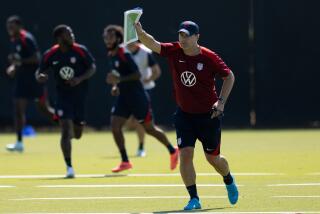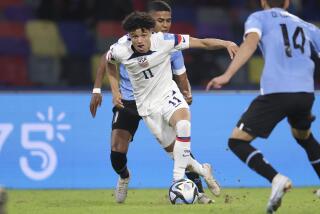U.S. Cup Planners Face Hard Questions From World Press
- Share via
ROME — American organizers of the 1994 World Cup got a cool, almost hostile reception from the international media today when they held a news conference to discuss plans for the tournament.
Several hundred journalists gathered to hear Scott LeTellier, president of the World Cup ’94 Organizing Committee; Werner Fricker, its chairman and president of the U.S. Soccer Federation, and Henry A. Kissinger, vice chairman of the organizing committee.
Only when Kissinger spoke or was asked questions was the mood one of cooperation. Otherwise, most questions carried a confrontational tone.
A South American broadcaster asked Fricker and LeTellier why the United States bothered bidding for the World Cup when soccer isn’t a major sport there.
“The United States is a tremendous soccer participation sport,” said LeTellier, who worked on the organizing committee for the 1984 Los Angeles Olympics. “At a time when many European countries find the number of participants dwindling, the contrary is the case in the United States.”
To support that claim, Fricker cited studies that show soccer to be the third-most popular participation sport among teen-agers, behind only basketball and volleyball and ahead of baseball, softball, football and hockey, and second in the under-12 category behind basketball.
Asked whether empty stadiums could be anticipated in 1994, Fricker said, “We will get total commitments, make every effort in every venue, to get a tremendous amount of enthusiasm generated. We will have other activities planned in communities to supplement (the soccer games).”
Added LeTellier: “We have wrestled with efforts how to develop the intense feeling for the sport that is so evident here in Italy. One unique aspect as Americans is that we all came from other countries at some point. There is not one country that does not have a strong expatriate community in the United States.”
LeTellier pointed to the popularity Brazilians would have in Miami or Poles in Chicago, if their teams qualify. What he didn’t say was that to get every team into areas where they are most popular would require a setup that runs contrary to the draw FIFA uses to determine each grouping. Under the current system, only the seeded teams automatically are placed in certain cities.
Television also was on the minds of many. Since NBC already said it won’t bid for rights and both CBS and ABC are likely to pass, it would appear cable TV will be the route organizers must take.
“TV is a problem,” Kissinger said. “But you can’t judge by the 2% that this World Cup has gotten (in the ratings). TNT, which has televised the games, is cable and you have to subscribe and live in an area that can get cable. And it was not heavily advertised.
“I’m confident and hopeful we will get reasonable television coverage. Even if not national, we will get local (coverage). I think we can solve this problem, but we have a lot of work to do.”
That the United States has no top-level league also troubled several questioners. Fricker insisted that a professional league will be developed and said international tournaments will be used to upgrade the standard of American soccer.
“We have to do something to get high-quality soccer played in the United States,” Kissinger said. “That is a way of getting it popular. It must be done.”
More to Read
Go beyond the scoreboard
Get the latest on L.A.'s teams in the daily Sports Report newsletter.
You may occasionally receive promotional content from the Los Angeles Times.






